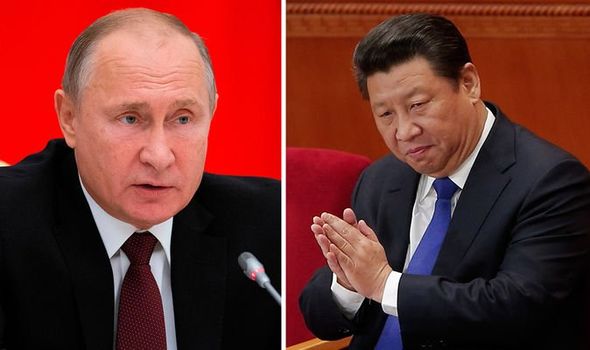On Thursday, Russian President Vladimir Putin made rather cryptic remarks which we believe were aimed at China. Putin has said that Russia will break the teeth of those looking to bite it. Putin has never minced his words, and this statement is definitely an indicator of how Moscow is not happy with some powers trying to eat into Russia’s exclusive sphere of influence – whether it be Central Asia, the Arctic or more recently, the Middle East.
Putin said, “Everyone wants to bite us somewhere or to bite off something from us.” … “But they — those who are going to do it — should know that we will knock out their teeth so that they cannot bite.” The remarks by Putin come in the backdrop of the Israel-Hamas war. As a matter of fact, Russia and China issued a joint statement of sorts, welcoming the ceasefire between Israel and Hamas. But of late, China, after forming an alliance with Iran, has become very assertive in the middle east, like it did in Central Asia and Eastern Europe, challenging Russia. Now, Russia may want to tell the paper dragon that it must accept Russian leadership in the Middle East and put to bed its own ambitions of replacing the United States in the region.
China was seen actively siding with Palestine, that is, with Hamas during the terror organisation’s recent conflict with Israel. Most recently, China has announced that it would be supplying $2 million to Gaza in an effort to rebuilt the strip. Additionally, China has also pledged 200,000 Covid-19 vaccines for Palestine. In fact, China believes that by supporting the ‘Palestinian cause’, it can win over a vast majority of the Gulf states. What it does not realise is that Palestine has come to become a secondary issue among even Arab nations, barring the likes of Turkey and Iran. Coincidentally, China finds its Middle East goals converging with both Ankara as well as with Tehran.
China has been losing out on goodwill in a big way across South and Southeast Asia. In Central Asia, which happens to be Russia’s sphere of influence, Chinese attempts to replace Moscow have yielded little to no results. Yet, China is adamant to pursue its goals of world domination and supremacy, which is why it has of late begun foraying into the Middle East – a complex conflict-ridden region. Russia, however, has been eyeing the Middle East, which was more evident in 2015, when it flew its troops into Syria, a key ally in the region, to prevent yet another regime change.
In March and April this year, Russia carried out an extravagant diplomatic outreach with almost all Middle Eastern powers. Russian Foreign Minister Sergey Lavrov visited the UAE, Saudi Arabia and Qatar in March. The next month, he was back on a tour covering Egypt and Iran. Russia has come to exercise its massive influence over the Middle East in recent times. Moscow’s Middle East drive has been propelled largely due to the aversion of the West, led by the United States, towards Russia.
In Syria, for instance, both Russia and Iran have begun competing for influence and economic gains, despite both of them backing Bashar al-Assad’s regime. Russia realises that Iran might be trying to assert itself in areas of Syria where Russia has traditionally had involvement at the behest of China. As for Turkey, Erdogan’s meeting with the Ukrainian president was countered by Moscow sending off its Foreign Minister to Egypt.
Meanwhile, by taking strategic and calculated steps against Iran and Turkey, Vladimir Putin is earning the admiration of the Saudi-led Arab world. Needless to say, when it comes to chasing out China from the region – which is riding currently on the back of Turkey and Iran, Russia will leverage its goodwill with Arab states to achieve the same.
Now, let’s connect the dots. In order to somehow save itself from being driven out of the Middle East by the Saudi-led Arab order at the behest of Russia, China is enthusiastically supporting Palestine over Israel. The fundamental premise of such a strategy on the part of Beijing is that the Arab world still happens to care about Palestine, which simply is not the case. So, Russia has got China surrounded from all sides in the Middle East already.
As for Israel, it has already displayed how it can side with Russia if the United States happens to abandon it once again. China is also asserting itself strongly against Israel but Russia has lowered its tone relatively, despite being Iran’s friend. At a time when Israel seeks more autonomy from the Biden administration, Russia knows it can find a friend in Israel. Meanwhile, China has botched its chance with Israel as it streamed anti-semitic propaganda through its state media.
Therefore, Chinese projects in Israel also stand in jeopardy now, courtesy of Beijing’s mindless support for Palestine. Whether it be the Haifa Port, the Israeli port in Ashdod being built by Chinese companies, a light railways project running through the greater Tel Aviv area or a $1.5 billion water desalination plant in the Jewish nation, all Chinese projects in Israel now stare at the prospect of being cancelled by Prime Minister Benjamin Netanyahu.
China was not able to overtake Russia in Central Asia. Needless to say, it will not be able to do the same in the Middle East as well. Vladimir Putin has a sophisticated plan to keep China at bay, while all that Beijing has is the Palestine card which it has already flashed way too much, albeit to no consequence.
